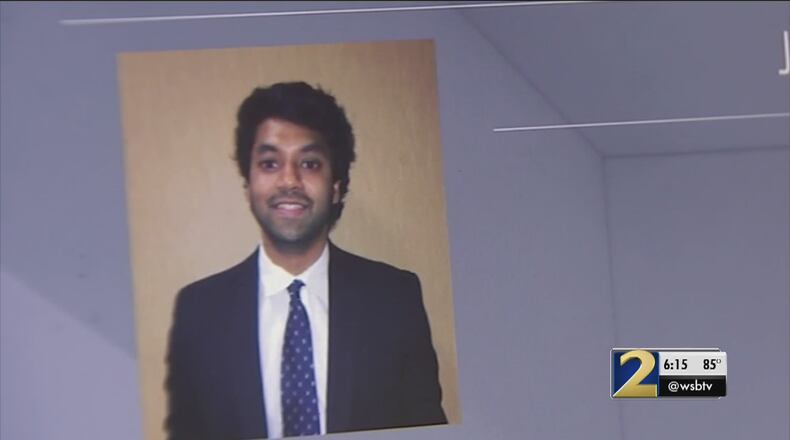A former University of Georgia student who pleaded guilty three years ago to running a Ponzi scheme from his Athens fraternity house has been accused by the Securities and Exchange Commission in a separate civil matter of defrauding brokerage firms before reporting to prison.
Syed Arham Arbab, 25, and five others are accused of operating a “free-riding” scheme from May 2019 to January 2021, in which the group made more than $2 million in fictitious deposits from empty or underfunded bank accounts into trading accounts at two brokerages, according to a lawsuit filed Monday in U.S. District Court in Atlanta.
Those deposits allegedly provided the defendants with more than $1.5 million in instant credits to use for stock trades. They then “withdrew or attempted to withdraw trading profits before the broker-dealers discovered the insufficient funds and froze the accounts,” the lawsuit said.
Arbab and his co-defendants reaped gains of less than $8,000, but their unfunded or underfunded trades resulted collectively in nearly $150,000 in losses to the brokerages, the complaint said.
Arbab allegedly started the “free-riding” fraud while he was under investigation for running a separate Ponzi scheme of fellow UGA students and their relatives. In October 2019, Arbab pleaded guilty to a sole criminal count of securities fraud for defrauding 117 people of about $1 million. He was later sentenced to five years in prison.
The Ponzi scheme involved investors in Arbab’s companies Artis Proficio Capital Management and Artis Proficio Capital Investments, which he ran from the Phi Kappa Tau fraternity house. Arbab spent investor funds on clothes, shoes, adult entertainment and gambling trips to Las Vegas, according to his 2019 indictment.
Arbab is currently incarcerated at a federal medium security prison in Marion, Illinois, where he is serving a five-year sentence. He is scheduled for release on May 29, 2025, according to the Federal Bureau of Prisons.
In this latest alleged fraud, Arbab is accused of being “the architect of this scheme.”
Arbab allegedly solicited at least two dozen participants via group messages, describing the free-riding scam as “a way to trade without capital.” Many refused him, but five people — three friends at UGA, a high school friend and one of Arbab’s relatives — agreed to participate, the complaint said.
Arbab explained the scheme as a way to make money at the expense of brokers, “whom he called ‘big corporations’ for whom he had ‘no remorse,’” the complaint said. In one text, Arbab said to not “tell anyone about this (because) this is what I’ve been doing... to scalp a few thousand (dollars).”
The scam hinges on a delay between online bank transfers, where a person utilizes “instant deposit” credit extended by brokerage firms to trade securities online. The profit made from those traded securities is then withdrawn before a bank rejects the transfer due to insufficient funds.
Investigators said some of the co-defendants gave Arbab access to their bank accounts so he could conduct the scheme, while others were coached on how to defraud brokers themselves. The other five defendants include Tomas Javier Jimenez, 24, of Dunwoody; Blake Douglas McKinney, 26, of Michigan; Mushfiqur Rahman, 21, of Jamaica, N.Y.; John Ryan Shows, 25, of Atlanta; and William Carl Spagnoli, 24, of Alpharetta.
The complaint seeks to “disgorge all ill-gotten gains and pay prejudgment interest thereon,” from all defendants except McKinney but does not specify an amount. It also seeks an unspecified civil penalty against everyone involved.
Robert D. Loventhal, an attorney representing Arbab and Rahman, told The Atlanta Journal-Constitution, “We are working toward settlement with the government.”
The SEC said three defendants — Jimenez, McKinney and Shows — agreed to judgments without admitting or denying the allegations. They would be prevented from partaking in certain future brokerage activities and would be subject to civil penalties. Jimenez and Shows also agreed to repay profits earned from the scam.
Emily Ward, an attorney for Jimenez, declined to discuss details but said her client “was a pretty minor player in this whole scheme.”
“He’s focused on taking the steps necessary to put this time in his life when he was a student in college behind him and build on his future career,” Ward said.
Raymond Henney, the attorney for McKinney, had a similar response, saying his client “agreed to resolve this matter with the SEC.” Attorneys representing Shows and Spagnoli did not immediately return requests for comment.
While Arbab is accused of running the scam before beginning his stint in prison, others have been accused of running their schemes from behind bars.
Earlier this year, federal authorities accused Georgia prison inmate Arthur Lee Cofield Jr., 31, of assuming the identity of a California billionaire movie mogul and stealing $11 million. Authorities said it’s potentially one of the biggest heists ever pulled off from inside an American prison.
Keep Reading
The Latest
Featured



